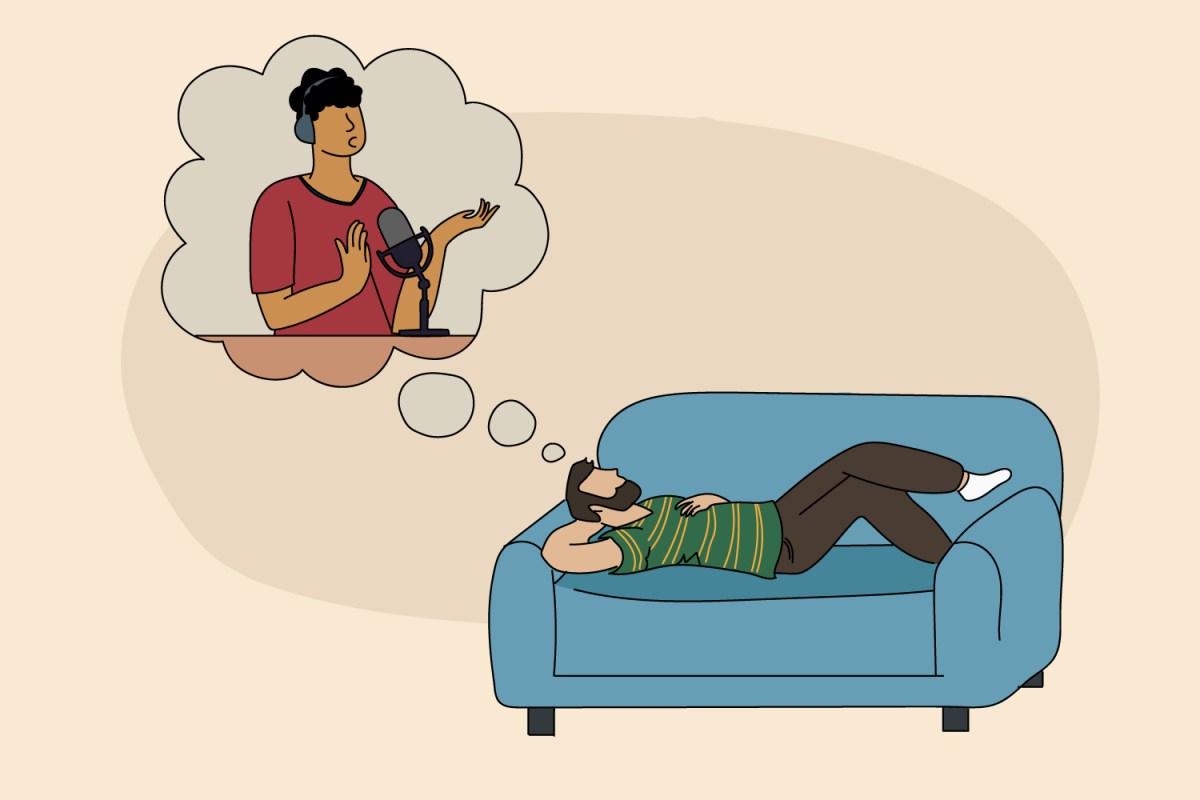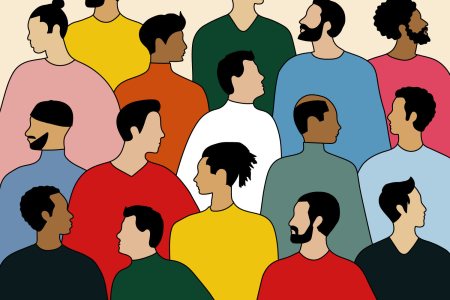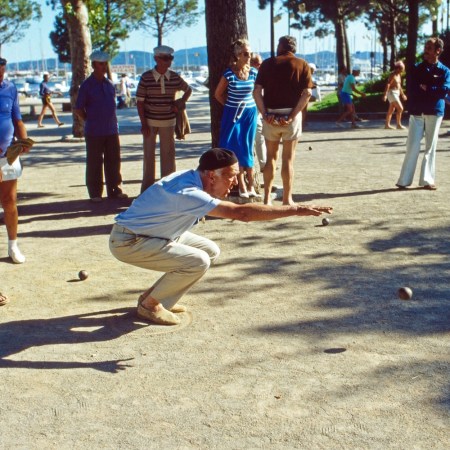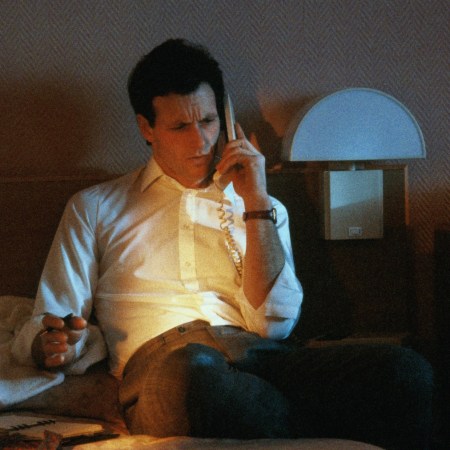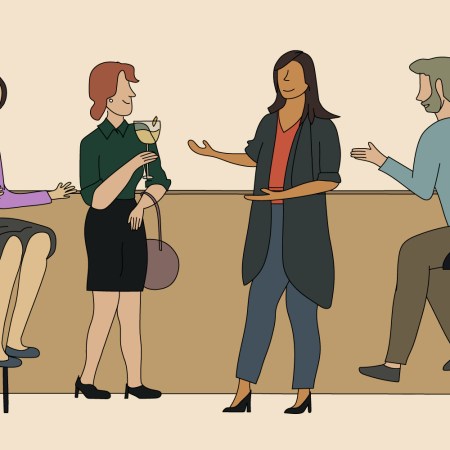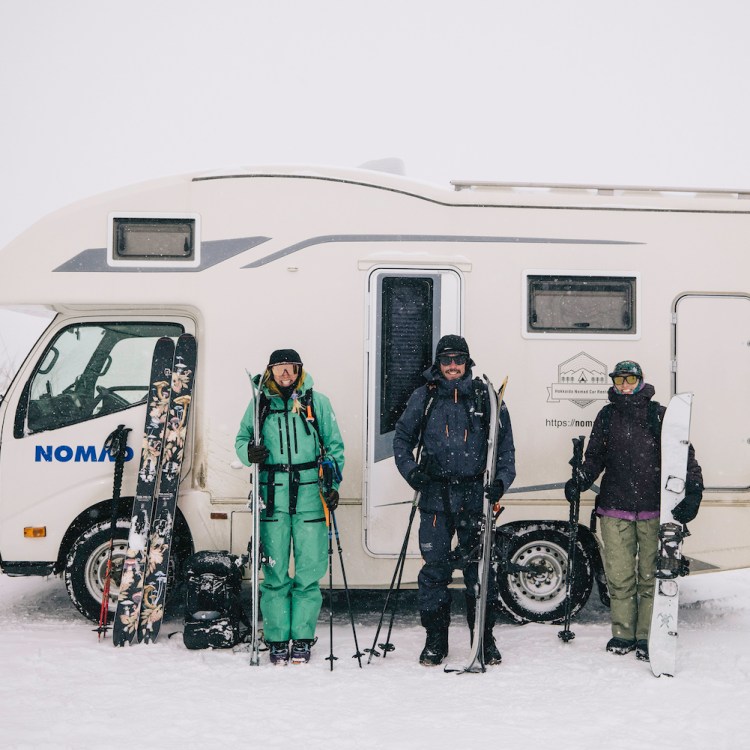During the month of April, we’re publishing a series of interviews, essays, advice columns and reported features about the male friendship crisis in the U.S., a particularly troubling slice of the country’s larger loneliness epidemic. There’s no one-size-fits-all solution, so we’re breaking it down from all angles in The Male Friendship Equation.
A study published in 2022 concluded that 51% of Americans have a parasocial relationship, though only 16% willingly “admit to it.” At first glance, don’t both of those numbers sound a little low? A parasocial relationship, by one useful definition, is a “one-sided relationship, where one person extends emotional energy, interest and time, and the other party, the persona, is completely unaware of the other’s existence.”
If you have ever cheered on a sports hero, eagerly awaited an album release from a musician, grieved the death of an author or attended a rally for a political candidate, you have nurtured a parasocial relationship with someone. The social-media age has only encouraged this behavior, making it easier for us to find people we identify with, keep up with them on a daily basis and defend them in the trenches of comment sections, sometimes confusing our support of them with our personality.
Are parasocial relationships unhealthy? Not necessarily. Experts don’t seem overly concerned about them. Assuming you’re a well-adjusted person (not a stalker) and the person you’re following is a decent role model (not one of the Paul brothers), the peculiar inequity that’s inherent to these “interactions” shouldn’t be something to stress over. It’s more important to monitor the pressure you’re exacting on the parasocial relationship. In other words, are you able to retain a firm grasp of who you are — your values, interests, humor, opinions and dreams — separate from the celebrity? And what are you expecting to receive in return for all your following?
The Male Friendship Equation: Meeting a Loneliness Crisis Head-On
Americans are increasingly isolated, especially men. This month, instead of despairing, we’re exploring the state of male friendship, warts and all.This is harder to discern with certain stars, whom some fans treat like the sun — orbiting devotedly around every single thing they do. The ultimate influence of this devotion is murky. Is the parasocial relationship brightening your days and tethering you to a community? Or is it burning your debit balance and upping your screentime?
I supposed it all depends on the nature of the fandom, on the who or what that you’re following. But personally, I’ve found it easier (and more fruitful) to foster casual parasocial relationships with lesser-known, lower-stakes media figures. One profession pops out in particular: podcasters.
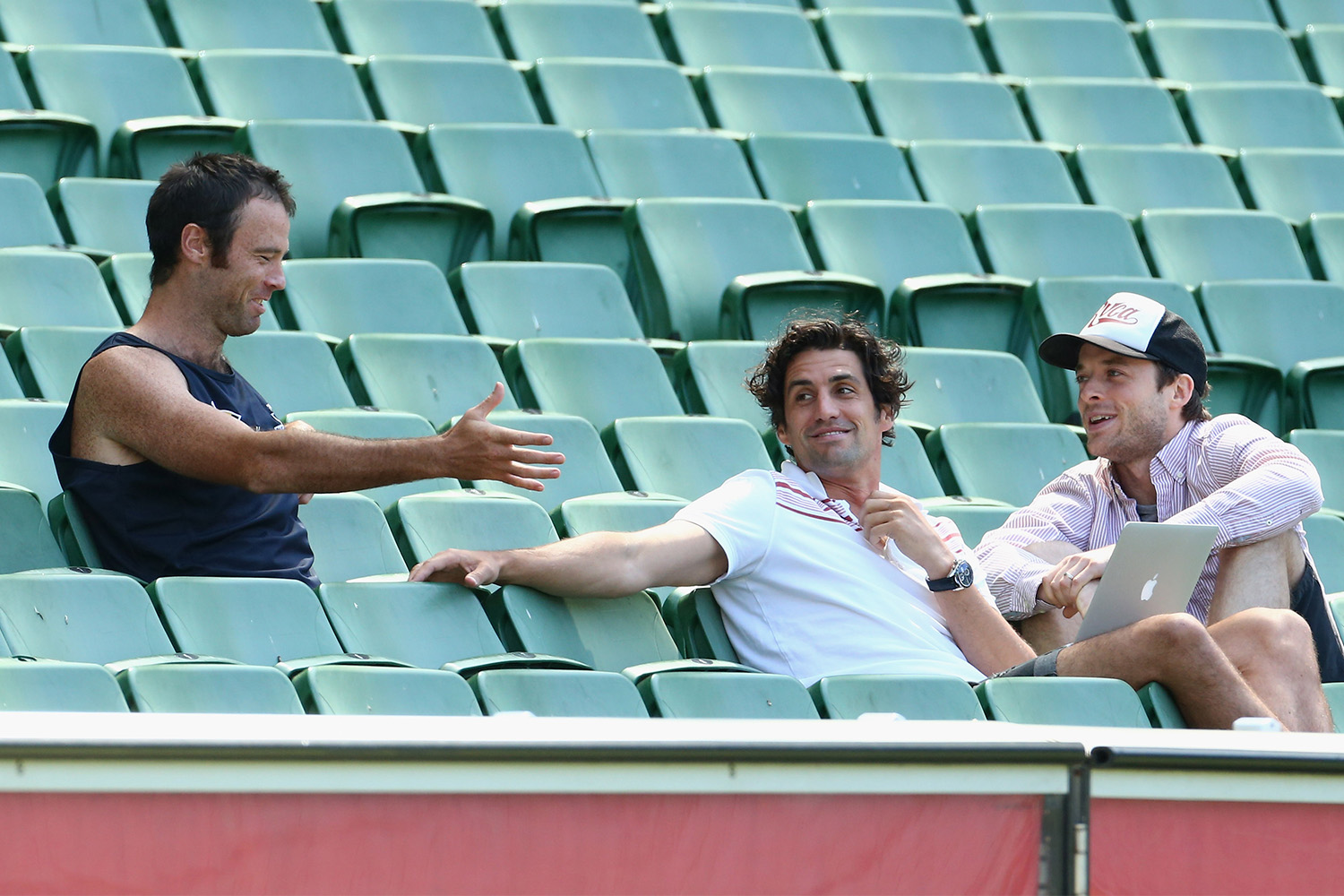
My girlfriend, who was born and raised in Sydney, Australia, introduced me to Hamish & Andy in 2022. The Aussie comedy duo of Hamish Blake and Andy Lee, both aged 42, had a legendary run on Melbourne radio before switching over to their weekly podcast in 2018. As of 2023, they claim around one million monthly listeners.
Their show is a mess of happy contradictions: scripted yet loose, inclusive yet chock-full of inside jokes. When my girlfriend initially introduced me to the podcast, she wanted me to start at the very first episode so I could understand the labyrinth of recurring bits. She was training for a half-marathon at the time and we’d each place an AirPod in an ear as we jogged around town. In the span of 45 minutes, Blake and Lee might riff on the irregular shape of Toblerones, try to write a modern surf song classic or terrorize their lovable assistant, Jack, for once again trying to leverage the show to score free swag.
Some of their best segments invite collaboration from their loyal audience. In “Upset Andy,” listeners call in with observations meant to rankle Lee, who’s famously neurotic (e.g., filling up gas tanks to obscure dollar amounts, like $43.67). In “Power Moves,” listeners nominate interpersonal flexes (e.g., when leaving a room of crowded people, you pat someone on the shoulder and say, “I’m leaving you in charge, mate”…implying that you had been in charge previously). And in “Chit Chat Champions,” listeners compete to generate reasonable small talk following bizarre prompts (experience it for yourself here).
It’s “had to be there” stuff, maybe, but that’s sort of the point: you can be there, whenever you want. My girlfriend and I still queue up Hamish & Andy together on subway rides or road trips, but I also listen to them on my own, during a work commute or long run. And with the snap of a finger — just the simple recall of, “Wait, I’m allowed do this, whenever” — I’m back in the room with them, probably confusing passersby, because I’m laughing like a maniac while running up a hill.
Over the years, I’ve also put on Hamish & Andy — or similar “hangout podcasts” like The Watch, SmartLess, Pod Save America and The Rewatchables — for a more intentional reason: I’m not just on a run or a train, I’m lonely.
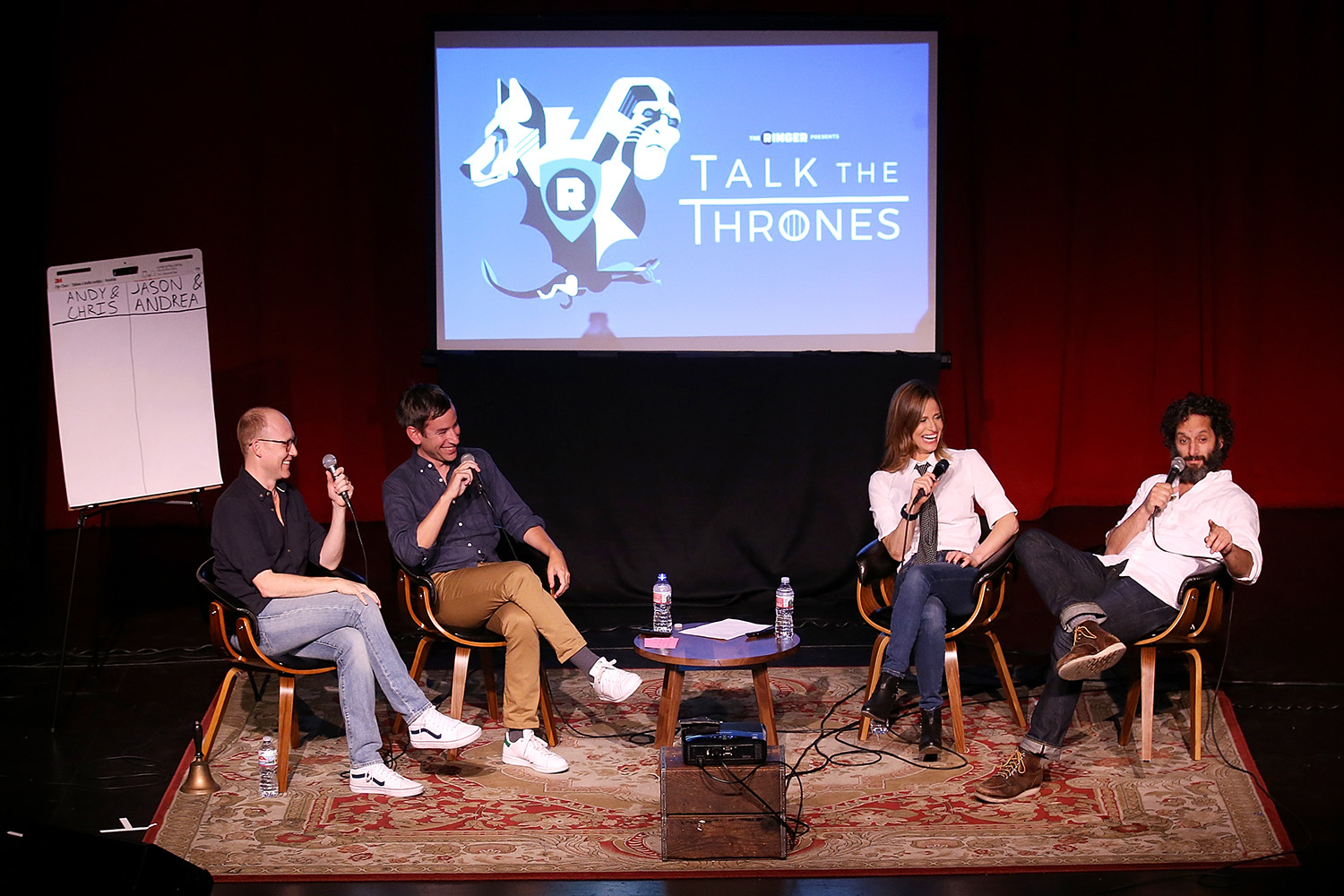
According to my personal Spotify data, The Watch is my most-listened-to podcast of adulthood. That tracks. Hosted by Chris Ryan (editorial director of The Ringer) and Andy Greenwald (former writer at Grantland and creator of the show Briarpatch), it’s an hour-ish pop-culture podcast. But it’s also a personal project: autobiographical, extemporaneous, nerdy. It’s highly skeptical of the industry it covers, especially in the streaming area.
Ryan is the buoyant captain of the ship — it’s evident (and more or less a bit) that he’s the only one preparing notes. He’s an absolute take machine. Greenwald, meanwhile, is a verbose critic by trade, highly instinctual but usually right. He skewers almost every show that falls into his homework lap. When he loves a show, though, or even just an episode, his praise knows no bounds. I loved listening to him discuss season two of The Bear last year.
After so many years of listening to them both, it’s strange how coolly encyclopedic my knowledge is of their lives and interests. Ryan doesn’t have children, Greenwald does. Ryan is the Heat to Greenwald’s Criterion Collection. But they’re both eloquent and inquisitive and passionate about TV and film, in a way that I hope has elevated the conversation in Hollywood. At the very least, it’s changed the way I consume (and search for) stories.
It seems reasonable to suggest that parasocial podcast relationships represent both a symptom of our lonely age and a potential salve.
And at the very most, it’s put a pair of voices in my head on days when I’ve sorely needed it. I have a way of vividly remembering exactly where I was when I listened to a podcast, down to the sentence uttered — something I seem to share with others online — and if I’m being honest, a lot of the imagery bouncing around my brain isn’t that pretty. I’m thinking of walking home in the dark, after a day at work, dodging rats or food delivery mopeds or snowbanks. City living.
It’s those days — and particularly the ends of them — that can compound my feelings of isolation. I do my best to sustain my family life, work life, exercising life and social life, but who can keep all these engines firing every week, if even every month? These podcasts are a social lifeline. They offer a chance to “kick back” with people who, crucially, care about each other. (Ryan starts every episode asking Greenwald how he spent the weekend. This part of the show is as interesting to me as the following 59 minutes.)
Make no mistake: parasocial relationships are no replacement for personal ones. I wouldn’t want to curate an ultimate existence where I’m more excited to “spend time” with people who don’t know my name than with those who do. And neither should you. As I noted in an earlier article of this male friendship series, “Friendships thrive on a combination of empathy, reciprocity, vulnerability, curiosity.” You can’t expect to have these needs met by a parasocial experience, even a healthy one with a stable of good-natured podcasters.
It seems reasonable to suggest that parasocial podcast relationships represent both a symptom of our lonely age and a potential salve. I wish I had a neater conclusion for you, but in some ways, isn’t this the best of both worlds? With a mixture of diligence and vulnerability, you can endeavor to make (and maintain) friends who are real, who know you in your real life; and you can also have niche, talented, endlessly hilarious ones in your ear, who make life’s miserable little moments — like standing on the grocery line — a little more tolerable.
Have your cake and listen to your podcasts, too, I say. Far from me to dictate your consumption, but I go for the humorous and human ones. The ones that put a smile on my face, that slow down the pace of my heart, that make me feel like I’m part of the club.
The Charge will help you move better, think clearer and stay in the game longer. Subscribe to our wellness newsletter today.
